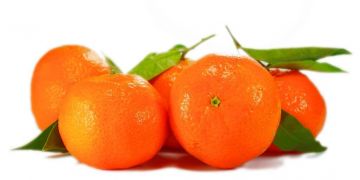Tangerine Trees
Tangerines grow upon small trees that originally came from China and Japan. The plants were first taken to Europe and later ended up in the United State. The fruit is bright orange, similar to an orange and easy to peel.
Tangerines are related to mandarin oranges. The main difference between the two is the time of harvest.
Tangerine Names
The Latin name for Tangerine is Citrus reticulata. In Chinese medicine, the name chen pi refers to dried ripe peel of a tangerine, qing piq refers to the unripe peel of the tangerine and ju he refers to the seeds.
Health Benefits
The peel of tangerines is very aromatic and has a pungent, bitter taste. When compared to the flesh of the tangerine, the peel has more antioxidants and flavonoids that may prevent cancer and enhance the effectiveness of Vitamin C in the body. Additionally, the essential oil of tangerine can provide many benefits to those who use it.
Digestion
The bacteria Helicobacter pylori has been found to contribute to peptic ulcers. Doctors often treat ulcers with antibiotics to kill H. pylori. However, tangerine supplements have been found to inhibit the growth of H. pylori. This means that, if you are suffering from a stomach ulcer, tangerine supplements may help you heal.
Obesity and Atherosclerosis
Studies have looked into the effects of nobiletin on mice. Nobiletin is a compound that is found naturally in the white portions of tangerine peels. Mice that were treated with nobiletin failed to develop obesity or atherosclerosis. Atherosclerosis refers to the build-up of fat in the arteries that can lead to heart attack or stroke.
Insulin Regulation
Additionally, these mice were better able to regulate their insulin and glucose levels. While scientists are still exploring the links between tangerine supplements, weight and diabetes, preliminary studies indicate that this fruit may help prevent these types of problems.
Lowering Cholesterol
A 2004 study indicated that a compound commonly found in tangerine peel, polymethoxylated flavones (PMFs), helps lower cholesterol. Scientists gave hamsters high cholesterol by giving them poor, fatty diets. Then, the rodents were fed PMFs. For 35 days, some of the hamsters were fed diets with one percent PMFs from tangerines. The researchers learned that the hamsters fed with tangerine supplements had LDL (bad) cholesterol that was 32 to 40 percent lower than the control group. No negative side effects were noticed in the animals, and the HDL (good) cholesterol was unaffected by the supplements.
Cancer Fighting
A 2007 British study has shown that certain compounds called salvestrols that are found abundantly in the peels of tangerines can cause cancer cells to self-destruct. The preliminary results indicate that cancer patients might benefit from taking a tangerine supplement. While clinical trials have not been performed on people, the evidence is promising.
Essential Oil Uses
Tangerine essential oil contain anti-fungal and antiseptic properties. For this reason, tangerine essential oil can be helpful in preventing and treating acne or skin infections. It can also be used for preventing stretch marks. Additionally, open wounds may benefit from the antiseptic properties of tangerine oil.
Taken internally, tangerine essential oil can help heal digestive complaints by fighting bacterial growth in the stomach. The odor of tangerine oil smells clean and fresh. Many believe that the smell of tangerine oil is calming when one is overexcited or stressed. In aromatherapy, tangerine oil can be used as a sedative to help one rest and relax.





